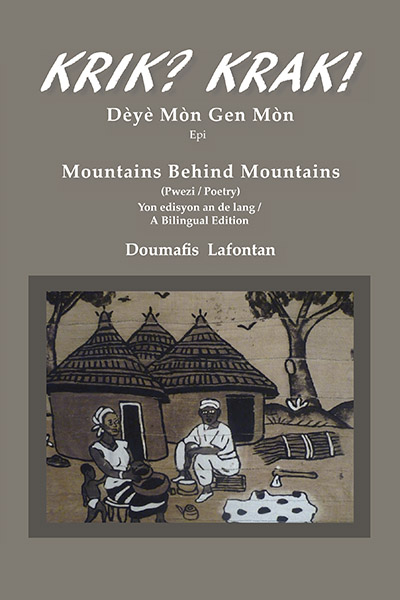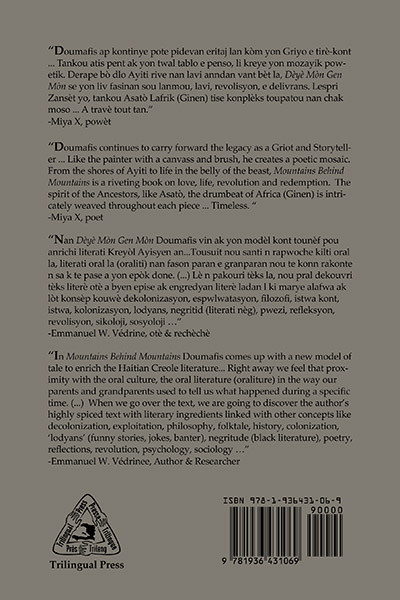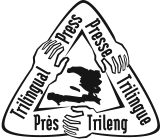
Doumafis Lafontan’s respect for the Haitian Creole language is something that always amazed me, especially in an environment where non-Western languages are devalued. His use of the Haitian Creole language is exemplar, as I happily noticed, in the Haitian Creole texts he submitted to us for publication in Tanbou, a serious effort at using Haitian Creole as a normal medium of analysis for political philosophy. You can see that for example in his discussions on Heller, Fanon, Hegel, Carruthers, etc., where he harnesses a Haitian Creole language altogether elevated and accessible.
Poet, political essayist and community activist, Doumafis brings to the mix, that is to the fermentation of political consciousness, a fresh air of rethinking nourished by an everyday praxis of resistance.
As you can see in the present collection, he intermingles poetry and critique in a consubstantial fashion—one and the other serving the same calling, the same objective to get the zombie to taste salt.* We are certain that the Haitian language will benefit from these efforts which add a positive element to the development of its riches.
From the outset in the book, which opens with the poem “Depi nan Ginen” (“Since Guinea”), Doumafis has signaled what kind of load he has in his bag: “Haiti lays between Atlantic and Pacific oceans / It is the hyphen of the old and new worlds / It constitutes the space where indigenous values / Tayino–African—European meet.” This poem along with others in the book denounce all that is not good in the world, including of course the misery Haiti and Haitians continue to endure.
In the poem “Lam, lam dlo,” Doumafis uses coded language we can read between the lines: “Wind blows / Thunder rumbles / Lightning striking / Darkness,” and he continues in this incendiary vein an overview of Haitian history where he doesn’t spare any evildoer, but where he brandishes the fundamental humanitarian values that founded the struggle against slavery and for social justice the vanipye (militant shoeless slaves) had consented to wage: “We are all inheritors of the world’s wealth / Share equally the goods. / The imperialist citadel has shaken.” Those aspirations and ideals remain certainly an objective for the future.
This book is a Pantheon, from Africa to Saint Domingue, of all Haiti’s history recited in a tale, in a poem, in a poetic exhortation, with an extraordinary critical lucidity. It’s a good book to read, as we know it’s always good to read Doumafis Lafontan.
—Tontongi June 2012
* In Haitian Vodou mythology, the zombie who tastes salt would regain consciousness.
Kèk mo sou liv Doumafis Lafontan an
Respè Doumafis Lafontan montre pou lang kreyòl ayisyen an se yon bagay ki toujou epate m, espesyalman nan yon anvironnman kote lang non-oksidantal yo pa valorize. Izaj li fè de lang kreyòl ayisyen an ekzanplè, kou mwen te byen kontan remake, nan tèks li voye ban nou pou piblikasyon nan Tanbou, yon jefò serye pou li itilize lang ayisyen an tankou yon medyòm analiz serye pou filozofi politik. Ou ka wè sa paekzanp nan diskisyon li sou Heller, Fanon, Hegel, Carruthers, elatriye, kote li anplwaye yon langaj kreyòl ayisyen alafwa elve e aksesif.

Powèt, eseyis politik e aktivis kominotè, Doumafis pote nan melanj lan, sètadi nan fèmantasyon konsyans politik, yon ti lè fre pou yon repansman ki nouri pa praksis rezistans chak jou nan lavi.
Kou nou ka wè nan koleksyon sila a, misye melanje pwezi ak kritik politik nan yon manyè konsibstansyèl—youn ak lòt sèvi menm ekzòtasyon, menm objektif pou fè zonbi goute sèl.* Nou sèten lang ayisyen an ap benefisye anpil de jefò sa yo, ki pote yon eleman pozitif nan devlopman richès li.
Depi nan papòt liv la, ki ouvri avèk powèm “Depi nan Ginen” an, Doumafis deja siyale ki koze li gen nan djakout li: “Ayiti kouche ant Oseyan Atlantik e Pasifik / Se trèdinyon ansyen monn e nouvo monn / Li konstitye espas kote valè Natifnatal / Tayino—Afriken—Ewopeyen rankontre.” Powèm sa a ansanm lòt ankò nan liv la denonse tout sa ki pa bon nan lemonn lan, san retire natirèlman malsite peyi Dayiti ak Ayisyen ap kontinye andire.
Nan powèm “Lam, lam dlo” a, Doumafis voye anpil pwen nou ka li antreliy: “Van soufle / Loraj gwonde / Kout zèklè / Fènwa”; li kontinye sou lanse andife sa a yon toudorizon sou listwa Dayiti kote li pa epaye ankenn malfezè, men kote li kenbe brandi valè imanitè fondamantal ki te fonde lit kont lesklavay e pou jistis sosyal vanipye yo te konsanti mennen a: “Tout moun eritye richès monn lan / Pataje byen yo egal. / Jistis ranplase mal / Verite retabli balans. / Loksidan tranble sou baz li. / Sitadèl enperyalis ebranle.” Li sèten aspirasyon ak ideyal so yo rete yon objektif pou lavni.
Liv sila a se yon panteyon, soti de Afrik rive nan Sendomeng, tout listwa Ayiti resite nan resi, nan powèm, nan ekzòtasyon powetik, avèk yon lisidite kritik ekstraòdinè. Se yon bon liv pou moun li, kou nou konnen li toujou bon pou nou li Doumafis Lafontan.
—Tontongi jen 2012
* Nan mitoloji vodou ayisyen an lè zonbi goute sèl li reprann nanm li.
